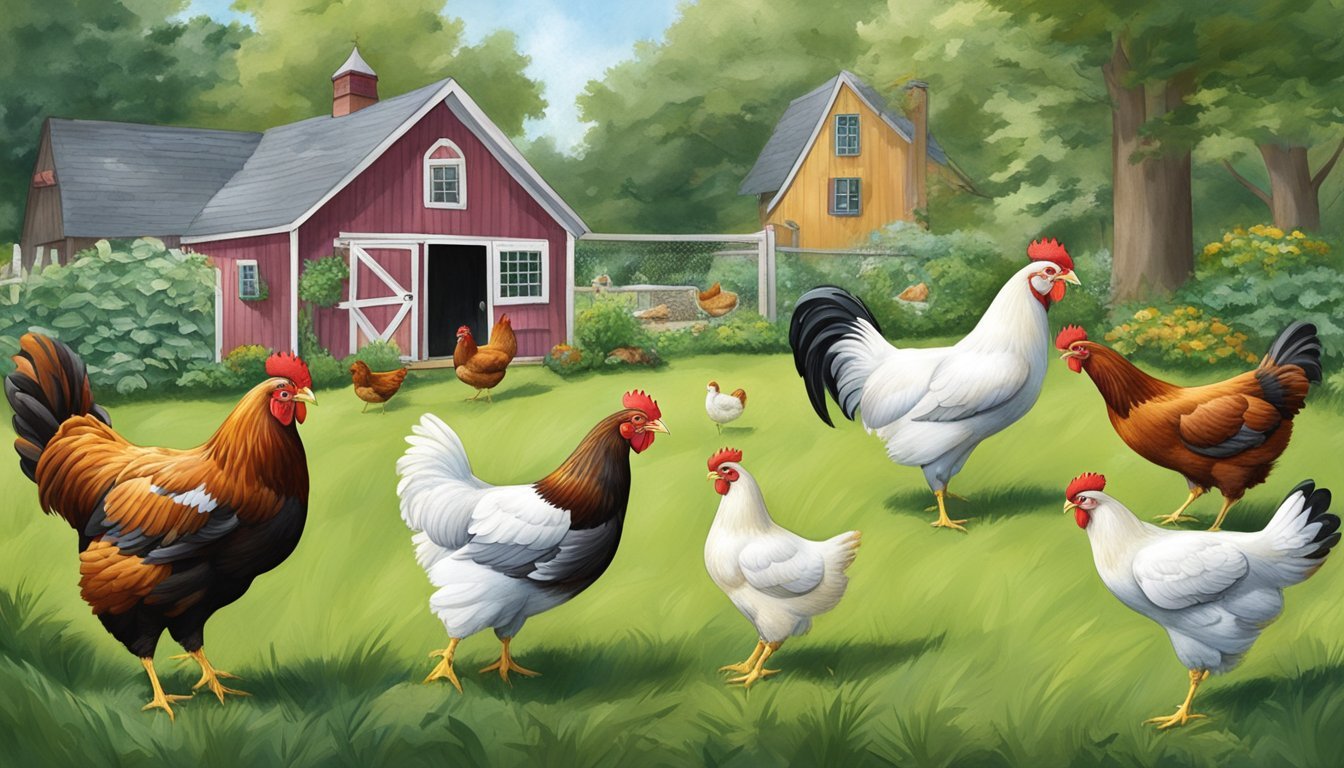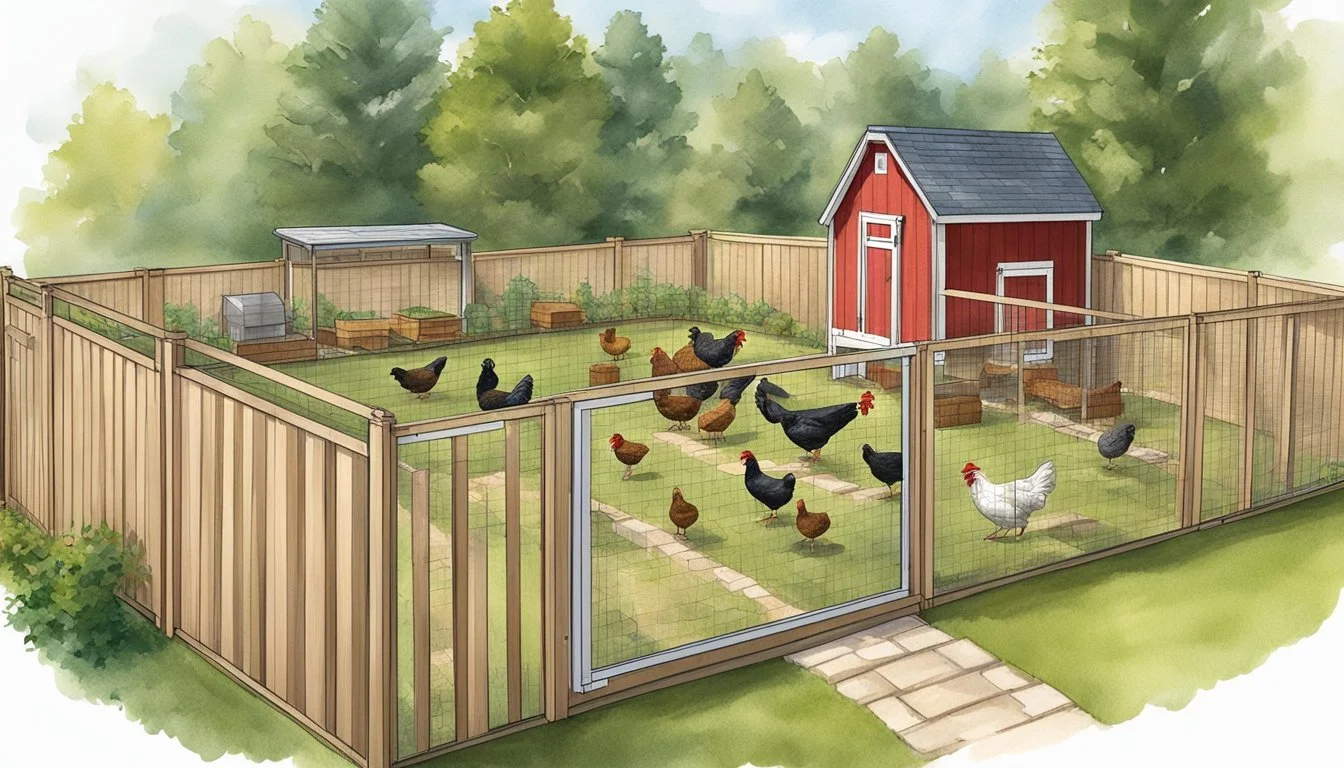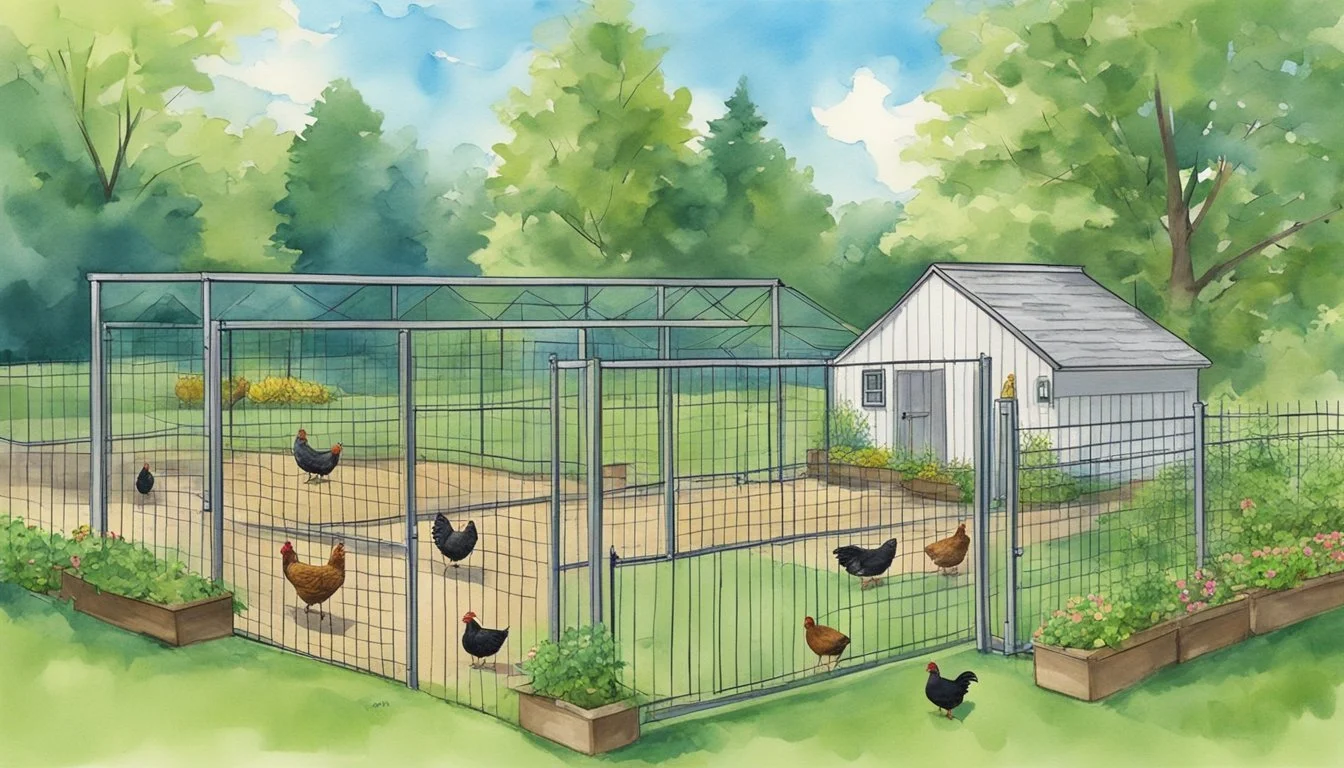Raising Backyard Chickens in Nashua, NH
A Practical Guide to Urban Poultry Farming
Raising backyard chickens has become an increasingly popular practice in Nashua, NH, appealing to residents for various reasons including fresh eggs, natural pest control, and educational benefits for families. Before embarking on establishing a backyard flock, it is essential to familiarize oneself with the specific regulations of Nashua to ensure compliance with local laws. The city mandates that any keeping of chickens adhere to the city ordinances and state laws, which outline provisions for proper housing and management of these birds to minimize the risk of disease transmission and to maintain the well-being of the animals.
The local regulations in Nashua are designed to balance the interests of chicken enthusiasts with public health and neighborhood harmony. For instance, NRO 93-3 and NRO 190-311 are key ordinances that outline the conditions under which residents may keep chickens, emphasizing the need for proper enclosures and maintenance routines. While Nashua does allow the raising of backyard chickens, residents must diligently follow these guidelines to ensure their activities do not create nuisances or health hazards.
Potential chicken keepers should also consider the practical aspects of raising poultry, such as the commitment to daily care, the cost of feed and coop construction, and the importance of protecting birds from predators and harsh weather. Comprehensive research and preparation are instrumental in successfully integrating chickens into one's urban backyard while harmonizing with Nashua's residential standards and respecting neighboring properties.
Understanding Local Chicken Laws
Within Nashua, NH, individuals must navigate both city regulations and state requirements when raising backyard poultry. Compliance ensures the health and safety of the community as well as the welfare of the chickens.
Nashua NH Regulations
There are specific regulations residents of Nashua need to be adherent to when it comes to keeping chickens in their backyards. According to the City of Nashua ordinances:
Housing and Location: Structures intended to house chickens must be built at a minimum distance of 45 feet from any building occupied by humans, unless special permission is obtained.
Zoning Restrictions: The local ordinances do not apply to R-40 and R-30 zoning districts.
New Hampshire State Requirements
In contrast to municipal codes, New Hampshire does not have specific statewide regulations for raising backyard chickens. They leave it to local city or county governments to establish their own rules. However, chicken owners in New Hampshire should still ensure their practices are in line with state laws that address animal welfare.
It is imperative for residents to check for updates regularly as local laws may evolve over time. Contacting Nashua officials directly provides the most current information.
Choosing the Right Chicken Breeds
When selecting chicken breeds for a backyard coop in Nashua, NH, it is crucial to consider the local climate and the purpose of the chickens, whether for egg production, meat, or as pets. Breed suitability for either egg-laying or meat, along with weather hardiness, should guide the decision-making process.
Popular Breeds for New Hampshire Climate
New Hampshire’s climate, characterized by cold winters and moderate summers, requires breeds that can tolerate these conditions. Here is a list of breeds well-suited to the region:
Rhode Island Reds: Hardy in cold weather and prolific brown egg layers.
Plymouth Rock: Known for their endurance in colder climates and consistent egg production.
Wyandotte: Another cold-hardy option, recognized for their beautiful plumage and good egg-laying capacity.
These breeds are typically resilient and can thrive in New Hampshire, ensuring a successful backyard flock.
Understanding Roosters vs. Hens
In Nashua, residents must be aware of the local laws governing the keeping of roosters and hens:
Roosters are typically more aggressive and vocal than hens. They can protect the flock but are often not allowed in urban areas due to noise ordinances.
Hens are quieter and are the egg producers. Most backyard flocks are kept for eggs, making hens the favorable choice for urban and suburban areas.
It is essential for potential chicken keepers in Nashua to check the local ordinances to ensure compliance when considering whether roosters are permissible in their backyard coop.
Setting Up Your Chicken Coop
When setting up a chicken coop in Nashua, NH, ensuring the safety and comfort of the chickens is paramount. The location, design, and maintenance of the coop are key factors that influence the well-being and productivity of backyard poultry.
Coop Location and Safety
The coop should be located in a well-drained area to prevent the accumulation of moisture that can lead to hazardous conditions for chickens. It should also be situated away from property lines to comply with local ordinances, ensuring both legal compliance and neighborly courtesy. Safety is a prime concern, so placing the coop within view from the house can allow for easy monitoring.
Protection from Predators and Weather
Chickens require protection from both predators and harsh New Hampshire weather conditions like wind, rain, and snow. The coop must have:
Sturdy construction: Reinforced with durable materials to withstand weather and deter predators.
Secure doors: Locks on all doors and entry points to keep predators out, especially at night.
Weatherproofing: Adequate roofing and insulation to protect from rain and snow. Consider elevated coops to prevent flooding.
Maintenance and Sanitation
Regular maintenance and cleaning are essential to prevent disease and ensure the longevity of the chicken coop. Owners should establish a routine that includes:
Ventilation checks: Ensure proper airflow to reduce humidity and ammonia levels.
Litter management: Replace bedding material frequently to maintain dryness and comfort.
Pest control: Regular inspections for signs of mites, lice, and other pests.
By addressing these specifics, one can create a secure and healthy environment for raising chickens in Nashua, NH.
Feeding and Raising Chickens
Raising backyard chickens in Nashua, NH, requires attention to diet and routine care to ensure healthy growth and optimal egg production.
Proper Chicken Nutrition
Chickens require a balanced diet to thrive, particularly in the varying climate of Nashua. Starter feed is crucial for chicks, typically a high-protein formula essential for their growth. As they develop, growers can transition chickens to layer feed, which is designed to provide the necessary nutrients for consistent egg production. This feed usually contains calcium, vital for strong eggshells. Additionally, chickens benefit from access to fresh, clean water at all times, which is critical for their digestion and overall health.
Routine Care and Raising Chicks
Chick rearing starts with a brooder, a warm, secure environment for the chicks for the first weeks of life. The brooder temperature should be kept at approximately 95 degrees Fahrenheit and reduced by 5 degrees each week until they are ready to acclimate to outdoor temperatures. For adult chickens, routine care includes regular coop cleaning to prevent disease, proper ventilation, and predator protection measures. It's essential to monitor the flock's health, looking out for signs of illness or distress.
Health and Welfare
Raising chickens in Nashua, NH, requires attentive care to ensure the health and welfare of the birds, particularly in areas such as protecting against extreme temperatures and maintaining proper conditions for egg laying.
Preventing Frostbite and Overheating
Frostbite is a serious concern for chickens during the cold New Hampshire winters. To safeguard against frostbite, particularly on the chickens' combs and wattles, owners should provide a well-ventilated yet draft-free coop. Adequate bedding and insulation are crucial, as is a dry environment within the coop to prevent moisture buildup.
In contrast, summer heat can lead to overheating. It's important to ensure the coop has ample shade and ventilation. Provisions for fresh water and electrolytes can be vital in preventing heat stress, and chickens should have space to dust bathe and access to cooler areas during peak summer heat.
Nesting and Egg Collecting
Proper nesting conditions are key to the welfare of laying hens and the quality of eggs produced. Nesting boxes should be kept clean and filled with soft, absorbent material. For standard-sized chickens, a nesting box size of 12"x12"x12" is generally recommended. These boxes should be placed in a quiet part of the coop to encourage use and reduce stress.
Egg collecting should be done regularly to prevent eggs from becoming dirty or damaged and to discourage hens from developing egg-eating habits. Frequent collection also reduces the risk of bacterial growth—such as Salmonella—and ensures that eggs are as fresh as possible for consumption.
Community Engagement and Support
Engaging with the Nashua community and leveraging local resources are essential steps in successfully raising backyard chickens. These efforts ensure compliance with regulations and enhance the experience through shared knowledge and support.
Joining Nashua Poultry Clubs
Poultry clubs in Nashua provide residents with a platform for learning best practices and networking with experienced chicken owners. These clubs often have regular meetings where members can discuss various aspects of poultry keeping, from coop construction to disease prevention. By joining a local poultry club, one gains immediate access to a wealth of community knowledge and experience.
Meetings: Learn from peers about chicken care.
Networking: Connect with experienced poultry owners.
Leveraging Local Agricultural Resources
The agricultural sector in Nashua supports backyard poultry enthusiasts through programs, seminars, and access to resources. One such example is the informational seminar held by Nashua Farmers' Exchange, which indicates a dedication to educating the public on proper poultry raising techniques. Both Nashua and its surrounding areas, like Concord, offer extension services and agricultural resources that can guide individuals through the process of raising chickens.
Seminars: Educational events, such as those provided by Nashua Farmers' Exchange.
Extension Services: Guidance on poultry care from agricultural experts in Nashua and Concord.
Advanced Topics in Chicken Keeping
In Nashua, NH, adept chicken keepers often explore the complexities of breeding and genetics along with sustainable practices to enhance self-sufficiency in their chicken raising endeavors.
Breeding and Genetics
Breeding chickens is not merely for increasing the flock. Enthusiasts in Nashua invest time in understanding genetics to produce chickens with desired traits, such as improved egg-laying abilities, disease resistance, and specific feather coloring. A breeder must maintain accurate records to track lineage and trait manifestation. Key considerations include:
Selective Breeding: This involves choosing chickens with preferable traits to parent the next generation.
Understanding Inheritance: Dominant and recessive genes play roles in the physical and behavioral traits of offspring.
Sustainable Practices and Self-Sufficiency
Sustainable chicken keeping revolves around creating a self-reliant ecosystem. Keepers focus on reducing waste, conserving resources, and enhancing the chickens' contribution to the garden and household. Practices include:
Composting: Chicken manure and bedding are composted to create nutrient-rich fertilizer for gardens.
Feed Production: Growing food such as grains and vegetables can lower reliance on store-bought feeds.
By mastering these advanced topics, chicken keepers in Nashua significantly improve the welfare of their chickens while contributing positively to the environment.
Conclusion
Raising backyard chickens in Nashua, NH, presents a fulfilling opportunity for residents. Individuals must adhere to city ordinances and state laws, which outline the parameters for keeping chickens, including coop requirements and restrictions on commercial activities, such as selling eggs or breeding.
Winter Care: It's crucial for individuals to provide extra care during the cold New Hampshire winters. Ensuring the chickens have a warm and dry coop can prevent health issues.
Salmonella Prevention: Handlers should practice good hygiene as chickens can carry bacteria, such as Salmonella. Regularly washing hands after contact is essential.
Legal Compliance: Residents are encouraged to stay informed about the latest local regulations to maintain compliance. Updates to the laws can occur, and it's the keeper's responsibility to stay updated.
Raising chickens in Nashua can be both enjoyable and educational, fostering a sense of self-sufficiency. If individuals follow guidelines and take the necessary measures for their chickens' health and safety, backyard poultry can be a successful endeavor in Nashua, NH.









